Sharpmindsrevisions
On this page, you find all documents, package deals, and flashcards offered by seller sharpmindsrevisions.
- 149
- 0
- 0
Community
- Followers
- Following
3 Reviews received
149 items
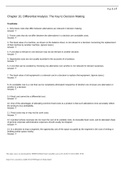
ACNT 2402Chapter 10 - Study Guide Questions and Answers(2022/2023)
Chapter 10, Differential Analysis: The Key to Decision Making True/False 1. Only future costs that differ between alternatives are relevant in decision making. Answer: T 2. Future costs that do not differ between the alternatives in a decision are avoidable costs. Answer: F 3. The book value of a machine, as shown on the balance sheet, is not relevant in a decision concerning the replacement of that machine by another machine. (Ignore taxes.) Answer: T 4. A cost that is relevant in one ...
- Other
- • 5 pages •
Chapter 10, Differential Analysis: The Key to Decision Making True/False 1. Only future costs that differ between alternatives are relevant in decision making. Answer: T 2. Future costs that do not differ between the alternatives in a decision are avoidable costs. Answer: F 3. The book value of a machine, as shown on the balance sheet, is not relevant in a decision concerning the replacement of that machine by another machine. (Ignore taxes.) Answer: T 4. A cost that is relevant in one ...
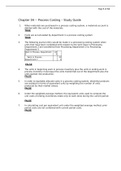
ACNT 2402Chapter 04 - Study Guide Questions and Answers(2022/2023)
Chapter 04 -- Process Costing – Study Guide 1. When materials are purchased in a process costing system, a materials account is debited with the cost of the materials. TRUE 2. Costs are accumulated by department in a process costing system. TRUE 3. The following journal entry would be made in a processing costing system when units that have been completed with respect to the work done in Processing Department Z are transferred from Processing Department Z to Processing Department Y: ...
- Other
- • 12 pages •
Chapter 04 -- Process Costing – Study Guide 1. When materials are purchased in a process costing system, a materials account is debited with the cost of the materials. TRUE 2. Costs are accumulated by department in a process costing system. TRUE 3. The following journal entry would be made in a processing costing system when units that have been completed with respect to the work done in Processing Department Z are transferred from Processing Department Z to Processing Department Y: ...
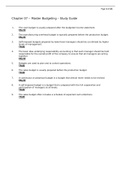
ACNT 2402Chapter 07 - Study Guide Questions and Answers(2022/2023)
Chapter 07 -- Master Budgeting – Study Guide 1. The cash budget is usually prepared after the budgeted income statement. FALSE 2. The manufacturing overhead budget is typically prepared before the production budget. FALSE 3. Self-imposed budgets prepared by lower-level managers should be scrutinized by higher levels of management. TRUE 4. The basic idea underlying responsibility accounting is that each manager should be held responsible for the overall profit of the company to ensure ...
- Other
- • 21 pages •
Chapter 07 -- Master Budgeting – Study Guide 1. The cash budget is usually prepared after the budgeted income statement. FALSE 2. The manufacturing overhead budget is typically prepared before the production budget. FALSE 3. Self-imposed budgets prepared by lower-level managers should be scrutinized by higher levels of management. TRUE 4. The basic idea underlying responsibility accounting is that each manager should be held responsible for the overall profit of the company to ensure ...
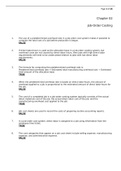
ACNT 2402Chapter 02 - Study GuideQuestions and Answers(2022/2023)
Chapter 02 Job-Order Costing 1. The use of a predetermined overhead rate in a job-order cost system makes it possible to compute the total cost of a job before production is begun. FALSE 2. If direct labor-hours is used as the allocation base in a job-order costing system, but overhead costs are not caused by direct-labor hours, then jobs with high direct labor requirements will tend to be undercosted relative to jobs with low direct labor requirements. FALSE 3. The formula for computi...
- Other
- • 26 pages •
Chapter 02 Job-Order Costing 1. The use of a predetermined overhead rate in a job-order cost system makes it possible to compute the total cost of a job before production is begun. FALSE 2. If direct labor-hours is used as the allocation base in a job-order costing system, but overhead costs are not caused by direct-labor hours, then jobs with high direct labor requirements will tend to be undercosted relative to jobs with low direct labor requirements. FALSE 3. The formula for computi...
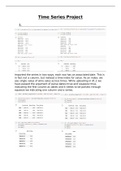
AA 1Time Series Project Questions and Answers(2022/2023)
Time Series Project 1. Imported the series in two ways, each row has an associated date. This is in fact not a column, but instead a time index for value. As an index, we see single value of wine sales across times. While uploading in df_1 we have passed the argument of parse dates=true and squeeze=true, indicating the first column as dates and it needs to be parsed, through squeeze we indicating one column and a series. While df_2 is upload without any argument we are adding time stamp ...
- Presentation
- • 45 pages •
Time Series Project 1. Imported the series in two ways, each row has an associated date. This is in fact not a column, but instead a time index for value. As an index, we see single value of wine sales across times. While uploading in df_1 we have passed the argument of parse dates=true and squeeze=true, indicating the first column as dates and it needs to be parsed, through squeeze we indicating one column and a series. While df_2 is upload without any argument we are adding time stamp ...
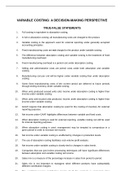
ACCT 2420 Variable Costing Questions and Answers(2022/2023)
VARIABLE COSTING: A DECISION-MAKING PERSPECTIVE TRUE-FALSE STATEMENTS 1. Full costing is equivalent to absorption costing. 2. In full or absorption costing, all manufacturing costs are charged to the product. 3. Variable costing is the approach used for external reporting under generally accepted accounting principles. 4. Fixed manufacturing costs are not charged to the product under variable costing. 5. The difference between absorption costing and variable costing is the treatment of fi...
- Exam (elaborations)
- • 10 pages •
VARIABLE COSTING: A DECISION-MAKING PERSPECTIVE TRUE-FALSE STATEMENTS 1. Full costing is equivalent to absorption costing. 2. In full or absorption costing, all manufacturing costs are charged to the product. 3. Variable costing is the approach used for external reporting under generally accepted accounting principles. 4. Fixed manufacturing costs are not charged to the product under variable costing. 5. The difference between absorption costing and variable costing is the treatment of fi...
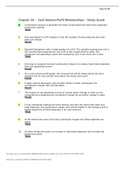
ACNT 2402Chapter 05 - Study Guide
Chapter 05 -- Cost-Volume-Profit Relationships – Study Guide 1. Incremental analysis is generally the most complicated and least direct approach to decision making. TRUE 2. One assumption in CVP analysis is that the number of units produced and sold does not change. FALSE 3. Reynold Enterprises sells a single product for $25. The variable expense per unit is $15 and the fixed expense per unit is $5 at the current level of sales. The company's net operating income will increase by $10...
- Other
- • 8 pages •
Chapter 05 -- Cost-Volume-Profit Relationships – Study Guide 1. Incremental analysis is generally the most complicated and least direct approach to decision making. TRUE 2. One assumption in CVP analysis is that the number of units produced and sold does not change. FALSE 3. Reynold Enterprises sells a single product for $25. The variable expense per unit is $15 and the fixed expense per unit is $5 at the current level of sales. The company's net operating income will increase by $10...
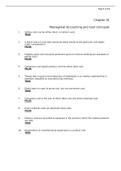
ACNT 2402Chapter 01 - Study Guide Questions and Answers(2022/2023)
Page 1 of 11 Chapter 01 Managerial Accounting and Cost Concepts 1. Selling costs can be either direct or indirect costs. TRUE 2. A direct cost is a cost that cannot be easily traced to the particular cost object under consideration. FALSE 3. Property taxes and insurance premiums paid on a factory building are examples of period costs. FALSE 4. Conversion cost equals product cost less direct labor cost. FALSE 5. Thread that is used in the production of mattresses is an indirect mater...
- Other
- • 11 pages •
Page 1 of 11 Chapter 01 Managerial Accounting and Cost Concepts 1. Selling costs can be either direct or indirect costs. TRUE 2. A direct cost is a cost that cannot be easily traced to the particular cost object under consideration. FALSE 3. Property taxes and insurance premiums paid on a factory building are examples of period costs. FALSE 4. Conversion cost equals product cost less direct labor cost. FALSE 5. Thread that is used in the production of mattresses is an indirect mater...
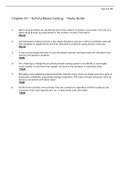
ACNT 2402Chapter 03 - Study Guide
Chapter 03 -- Activity-Based Costing - Study Guide 1. Batch-level activities are performed each time a batch of goods is processed. The cost of a batch-level activity is proportional to the number of units in the batch. FALSE 2. Activity-based costing involves a two-stage allocation process in which overhead costs are first assigned to departments and then allocated to products using activity measures. FALSE 3. In the second-stage allocation in activity-based costing, overhead costs are a...
- Other
- • 14 pages •
Chapter 03 -- Activity-Based Costing - Study Guide 1. Batch-level activities are performed each time a batch of goods is processed. The cost of a batch-level activity is proportional to the number of units in the batch. FALSE 2. Activity-based costing involves a two-stage allocation process in which overhead costs are first assigned to departments and then allocated to products using activity measures. FALSE 3. In the second-stage allocation in activity-based costing, overhead costs are a...
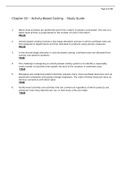
ACNT 2402Chapter 03 - Study Guide
Chapter 03 -- Activity-Based Costing - Study Guide 1. Batch-level activities are performed each time a batch of goods is processed. The cost of a batch-level activity is proportional to the number of units in the batch. FALSE 2. Activity-based costing involves a two-stage allocation process in which overhead costs are first assigned to departments and then allocated to products using activity measures. FALSE 3. In the second-stage allocation in activity-based costing, overhead costs are a...
- Other
- • 14 pages •
Chapter 03 -- Activity-Based Costing - Study Guide 1. Batch-level activities are performed each time a batch of goods is processed. The cost of a batch-level activity is proportional to the number of units in the batch. FALSE 2. Activity-based costing involves a two-stage allocation process in which overhead costs are first assigned to departments and then allocated to products using activity measures. FALSE 3. In the second-stage allocation in activity-based costing, overhead costs are a...

NURSING MS C922 Questions with 100% Correct Answers | Verified | Latest Update
NURSING MS C946 Questions with 100% Correct Answers | Verified | Latest Update
NURSING MS C922 Questions with 100% Correct Answers | Verified | Latest Update